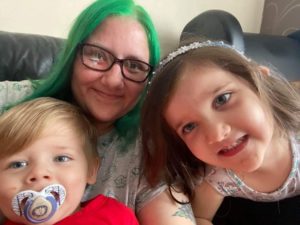by Sally Churchward.
The Prime Minister Boris Johnson has said that every child should be in school. But many parents are choosing to face fines by keeping their children at home or deregistering them. Could the government’s hardline approach to getting children back to school backfire, with parents being forced to choose between the best educational option for their children and their family’s health?
‘Back to school’ scream the adverts for anything that can conceivably be sold to parents at the beginning of the new school year. But despite the assertions of the Government that all children should be in school and that schools are ‘covid safe’, for many youngsters, the start of September means returning to the kitchen table, not the classroom, for lessons.
The vast majority of children have returned to school for the start of the 2020/21 academic year. But while studies show that children are very unlikely to get ill from coronavirus, many parents do not find these sufficiently reassuring to return their children to a setting with anything from 15 to 200 plus children per ‘bubble’. Some cite potential flaws in the research – one much quoted study was carried out when most children were not at school, in the early summer – and question the relevance of the findings. Others point out that while children may be unlikely to become ill, the evidence is that they can transmit the virus, and they are concerned for themselves, loved ones or the community at large. Others still, cannot square the limitations they have been living under up to this point, and continue to live with, with sending their children to school, to mix fairly freely with such a large number of their peers, in an indoor setting. The recent government announcement banning social groups of more than six meeting due to a sharp rise in the infection and death rates has further strengthened their concerns.
Currently, the vast majority of parents who want to keep their children off school are faced with two options – to simply not send them and face fines and even the threat of imprisonment in a worst case scenario, or to deregister them, taking them out of school permanently, or until it feels safe enough to reapply. While many people choose to home school their children for a variety of reasons and with great success, for parents who simply do not want to send their children to school at present due to health concerns, their options are far from ideal.

Kerry, from Highlands in Fareham, is currently keeping her six-year-old daughter Sinead off school. She and Sinead are both asthmatic and Kerry withdrew her child from school two weeks before the lockdown began in March due to health concerns. She, her husband and Sinead are in a family bubble with her adult daughter and Kerry’s baby grandson, who has a lung condition having been born prematurely.
“We are in a bubble of five,” said Kerry. “If we sent her to school, she’d be mixing with hundreds of other children, extended to thousands through families. There are people with jobs which mean they’re exposed to a large number of people, people who have been abroad, and that’s why we refuse to send her now.
“We have kept to just the five of us all this time, and have only seen other people, even close family, at a distance outside. We are venturing out for walks but still in our bubble. We don’t see anyone indoors.
“I don’t want my daughter to lose her school place, but I don’t want to be bullied into sending her to school either. We have said that we won’t be sending her in for at least two weeks, but I think it’s more likely to be not until after the October half term.
“We’ve been warned that we’ll probably be fined so I’ll see them in court. I’m safeguarding. No school can offer guarantees about children’s safety. I can’t understand why classes aren’t being split in half and home educated for half the week.
“We don’t want to have to deregister her. I want her to have the social interaction with children her age once it’s safe to send her back. That’s my only real concern about her not being at school. She’s reading and doing maths above her age and her mental health is fine.”
Kerry’s comments reflect those of many other parents, as can be seen on numerous social media groups. She does not want to keep her child off school. She and her husband have made a difficult decision based on wishing to keep Sinead and the rest of their family safe.
“I left it really late to tell the school she wasn’t coming back to start with because the situation is changing from day to day,” she explained. “We really want her to get back to school asap, but we want it to be safe, and people don’t seem to be taking coronavirus seriously anymore.”
While some parents are hanging on to see how the situation unfolds, and are keeping their children off temporarily, others have deregistered their children. For some, this has clearly been an act of desperation – they cannot afford to be fined, and find the anxiety of not knowing what is going to happen too much, choosing to throw the dice for themselves by opting out. For others, like Amy, it wasn’t a snap decision, though not one she would have chosen for her five-year-old daughter Evie in other circumstances.

Amy and Evie live with Evie’s father, Dave, and the couple’s youngest, aged two, in Shrewsbury. Dave has MS and is immunocompromised. Amy explained that even when the children came home from school with very run-of-the-mill bugs, the couple would do their best to prevent Dave from getting them, as if he did he would always become very ill. Dave was not put on the official shielding list but was advised to shield by his doctor. The couple withdrew their daughter from school the week before schools were closed to all but vulnerable children and those of key workers, and have been shielding since.
“We couldn’t risk Dave dying – that’s what would be likely to happen if he caught coronavirus,” said Amy. “We started home educating in March and Evie took to it really well, asking lots of open questions and it’s enabled us to be led by her.”
The couple made the decision to deregister Evie in July, when the government announced that school would be compulsory from September. Amy is Dave’s full-time carer and their financial situation meant they could not consider choosing to keep Evie on the school register and be fined.

“We couldn’t afford to pay fines for god knows how long it will be before it feels safe, “ she said. “And even if we could afford to pay, we wouldn’t want to do so – parents shouldn’t be fined for keeping their children safe. This is a pandemic. It’s uncharted territory for everyone, including the government and schools. This is your child. They mean more to you than anything and you have a legal duty to protect them. I don’t believe parents should be forced to choose between being fined or sending their child to school.
“Gavin Williamson (Secretary of State for Education) and others have said that it’s detrimental to children’s mental health to keep them off school. What’s more detrimental – being home educated for a year or spending the rest of her life without her daddy if she brings the virus home and it kills him?
“If we had been given the flexibility of online learning and not being fined for keeping Evie at home, that’s what we would have done. It would have meant we had the resources from the school and would have given us the best of both worlds in the circumstances.”
Gemma Sewell from Essex co-runs parent-led pressure group BRTUS: Parents United (Boycott Return to Unsafe Schools). The group was formed earlier this year to help support parents and organise for a safe return to school for children. The group has various social media platforms, with more than 10,600 members of its Facebook group, while more than 114,600 have signed a petition organised by a group member calling for fines to parents for keeping their children home during the pandemic to be dropped. The group is currently focused on mapping cases at schools. Gemma has added 174 schools to the map in the last few days and adds that she has many more to upload. She said that she knows of thousands of parents who are not sending their children to school at present or who have deregistered, some of whom have felt pressured to do so.

“I think the number of parents who are doing this is being under reported,” she said. “Partly this is because of schools saying to parents ‘take two weeks and then we’ll talk’. The trouble with that is it’s treating the issue as if it’s parental or child anxiety and it can be that, but it’s often very real worry.
“If you look at the attendance figures, that doesn’t tell you how many children have been deregistered from school. We don’t know those figures yet, but we do know that the platform Twinkl, which is largely used by those home educating, has had a huge increase in the number of individual users over the past few weeks and it’s likely that that’s from people who have recently deregistered their children.”
Gemma believes that the Government needs to bring in a more robust four tier system, meaning that as the infection rate rises in a particular area, more action is taken.
“That kernel of an idea that the Government has had is OK, but they need to really use it. Even in Bolton, they’ve only gone up one tier, which means senior schools have the option to tell children to wear face coverings in communal areas. It’s not until tier 4 that primary schools are affected, and at that stage, they just shut them. There’s no move to partial closure in the meantime.
“We want clear, transparent, reasonable thresholds. If there are 10 cases per 100,000, we want schools to move to blended learning, which is what the Independent Sage group advise. This would mean combining classroom and home learning. Obviously, there would be children who would need to go to school all the time, for a variety of reasons, and there would also need to be additional teachers and space to manage that, for instance, by using community rooms, and we would need to go back to bubbles of 15.
“If cases reach 50 per 100,000 then we want to return to only children of key workers and vulnerable children, with home learning being offered. That means schools need more staff in order to provide proper interactive home learning.
“We also want to see the threat of fines removed. This is no time to be fining parents. It should be compliance by consent. If someone is anxious, how is fining and threatening them going to alleviate that? People are making the choices they are to keep their children off because they feel they have no option. Often families where a member is in ill health are already suffering from a decreased income, so financially punishing them for protecting that family member should definitely not be happening.”
Gemma says there is widespread concern that children who are withdrawn from school not because parents are choosing home education as such, but because they want to keep their children safe, will suffer educationally, and that the government’s approach of fines and not allowing schools to support parents keeping their children off is the root of the problem. In tandem with the pressure groups she is involved in, she runs Ed 2 BRTUS , for which teachers have anonymously provided content for parents who are home educating their children due to the pandemic with educational material.
“Home education is a whole thing in itself, but not everyone who deregisters wants to home educate. They want school-type learning but don’t know where to start, and we are providing that,” Gemma said.
“A huge number of parents are deregistering their children and are saying they want to make sure their child can come out of home education in a year or two and go back to school,” she added. “The worry is that if they don’t have the resources, their kids will struggle. The big concern is that they will do their best, but without proper support, they will be behind and teachers will then be under pressure to pick that up, without the funding or support that’s needed.
“It’s all a car crash, really.”
With many parents having sent their children back to school reluctantly, in addition to those already keeping their kids off, concerns about the impact on coronavirus of students returning to university as well as children going back to school and warnings of a second wave of the virus, it remains to be seen whether the government will revise its position on fines and remote learning, or whether more parents will feel reassured that schools are sufficiently safe for their children to return. In the meantime, many parents across the country will continue to double up as teachers, regardless of the pleas of those in Government for them to get their children back to school.
- Main image posed by models. Picture by August de Richelieu from Pexels.

